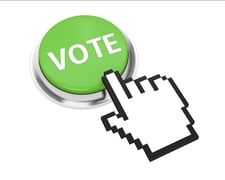By Nelson Cary and Christina Otero*
The United Steelworkers union lost an election at a tape manufacturing facility, with 97 votes for and 142 votes against the union. During the campaign, however, the employer confiscated union literature from the employees’ break room and engaged in surveillance of employees’ union activities. For these transgressions, a majority of the NLRB gave the Steelworkers a “second bite at the apple,” throwing out the first election, and ordering a second election.
The evidence in the case established that before the union filed its representation petition, plant supervisors would remove any literature from the break room at the end of the day. After the Union filed the petition and employees started leaving union fliers in the break room, however, supervisors removed or discarded the fliers immediately after the break. Therefore, the NLRB majority held that removing the union literature was an unlawful “reaction to and countermeasure against the union campaign.”
 Further, despite never having done so before the election, the employer distributed leaflets at the plant’s gate at the same time as union supporters distributed literature. In rejecting the employer’s argument that it was exercising its right under Section 8(c) to communicate to employees, the NLRB noted that such communication is unlawful if it is “out of the ordinary” and places employees under surveillance. Because the employer usually communicated to employees through meetings, and there was no evidence of any pre-campaign leafleting at the gate, this communication was out of the ordinary. Further, because it allowed the employer to watch who distributed and accepted leaflets, the employees’ union activities were under surveillance.
Further, despite never having done so before the election, the employer distributed leaflets at the plant’s gate at the same time as union supporters distributed literature. In rejecting the employer’s argument that it was exercising its right under Section 8(c) to communicate to employees, the NLRB noted that such communication is unlawful if it is “out of the ordinary” and places employees under surveillance. Because the employer usually communicated to employees through meetings, and there was no evidence of any pre-campaign leafleting at the gate, this communication was out of the ordinary. Further, because it allowed the employer to watch who distributed and accepted leaflets, the employees’ union activities were under surveillance.
The NLRB also held that the employer violated the Act when a supervisor interrogated his direct subordinate about his view of the union, telling him “it can hurt you.” The NLRB did not consider the unlawful interrogation in determining to set aside the election, however, because it occurred before the union filed its representation petition.
Member Miscimarra (R) dissented. Not only did he think that the employer’s conduct was lawful, he believed that even if it was unlawful, it would not justify invalidating the election. Noting the wide vote margin, he argued that employees had many other opportunities to view union literature, and removing the fliers from the break room a few hours earlier could not have affected the lopsided result. He also noted that it was “implausible” to suggest that employees would change their votes merely because the employer saw them engaging in the open activity of distributing or accepting campaign fliers. Indeed, on at least one occasion, the employer started distributing leaflets before any union supporters even arrived to do the same thing.
For labor professionals, the decision demonstrates the importance of carefully responding to union activity. Here, it took only two instances of unlawful activity for the NLRB to conclude that the union should get another opportunity to convince employees to vote for it. Thus, departures from an employer’s normal practice during union organizing must be carefully evaluated and supervisors trained to conduct themselves in a lawful manner.
*Ms. Otero is currently a student at The Ohio State University Moritz School of Law, and is working for Vorys, Sater, Seymour and Pease LLP as a Summer Associate.
